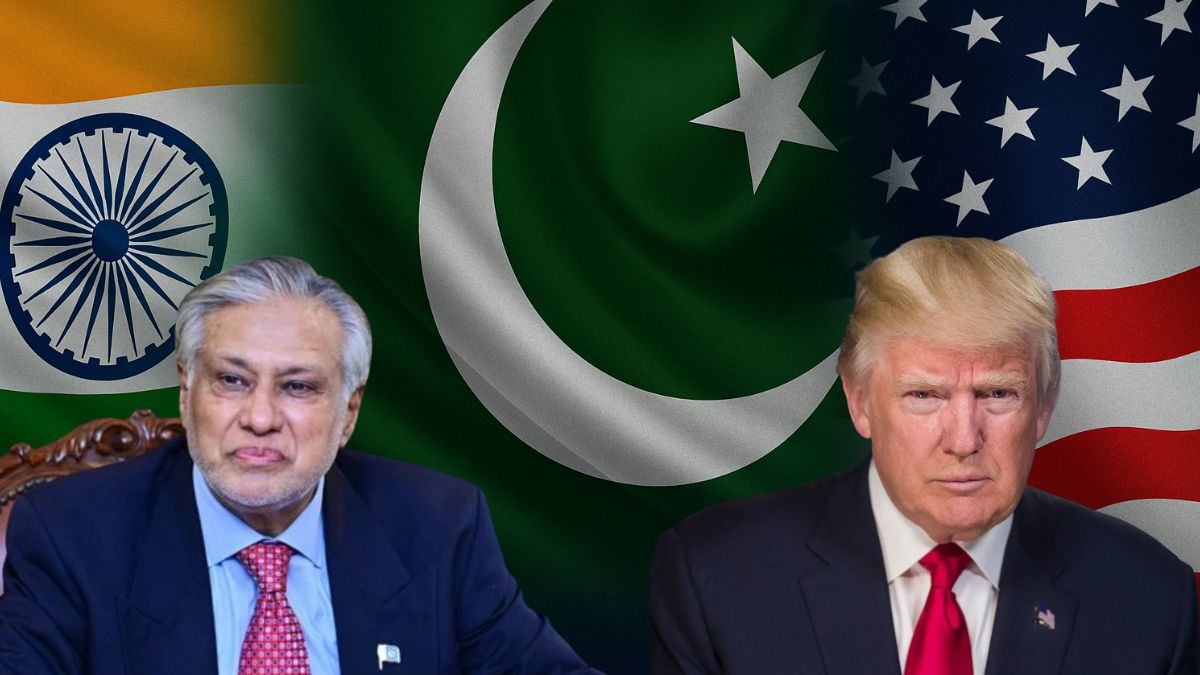Pakistan FM Ishaq Dar Says India Never Accepted 3rd Party Mediation, Busts Trump’s Claim

Pakistan FM Ishaq Dar’s admission that India never accepted third-party mediation directly challenges Donald Trump’s ceasefire claim, reshaping the narrative of Operation Sindoor.Imge courteesy RNA
In a rare and candid admission, Pakistan’s Foreign Minister Ishaq Dar has confirmed that India has never agreed to any third-party mediation on bilateral issues, directly contradicting former US President Donald Trump’s repeated claims that he brokered a ceasefire between the two nuclear-armed neighbours in the aftermath of Operation Sindoor.
Speaking to Al Jazeera, Dar stated, “India never agreed to any third-party mediation.” He explained that while Pakistan is open to dialogue with New Delhi, India has consistently maintained that all disputes must be resolved bilaterally under the 1971 Simla Agreement.
How did Dar undercut Trump’s mediation narrative?
Dar’s comments effectively puncture Trump’s long-standing assertions that his administration mediated peace after the intense 4-day exchange of strikes between India and Pakistan in May 2025.
Trump had claimed credit for preventing a potential “nuclear war” and even announced a ceasefire on his social media platform, Truth Social, on May 10, hours before either country officially acknowledged halting military action.
“We don’t mind third-party involvement, but India has categorically been stating it’s a bilateral matter. Unless India wishes to have a dialogue, we can’t force dialogue,” Dar added.
The Pakistani minister also revealed that a ceasefire proposal had indeed been conveyed through Washington, along with a suggestion of holding talks at a neutral venue.
However, when he met US Secretary of State Marco Rubio in Washington on July 25, 2025, he was told that India had not agreed to the idea and insisted the issue was strictly bilateral.
What is the ceasefire reality versus Trump’s claim?
Dar disclosed that Pakistan directly asked Washington about Trump’s mediation claims, only to receive confirmation that India had rejected them. This validates India’s stance that the May 10 ceasefire understanding came solely after Pakistan’s Director-General of Military Operations (DGMO) reached out to his Indian counterpart.
On that day, Indian Foreign Secretary Vikram Misri had categorically stated: “The DGMO of Pakistan called the DGMO of India at 3:35 pm. It was agreed between them that both sides would stop all firing and military action by 5 pm.”
India later clarified that this was not a formal ceasefire but a mutual decision to stop strikes after Pakistan requested de-escalation. External Affairs Minister S. Jaishankar reiterated that any future talks with Pakistan would remain limited to terrorism and Pakistan-Occupied Kashmir (PoK).
What are Trump’s boastful statements?
Despite India’s repeated clarifications, Trump continued to tout his role in halting hostilities. On May 31, he told reporters, “I think the deal I’m most proud of is stopping a potential nuclear war between India and Pakistan. Normally, they do it through bullets; we did it through trade.”
This was not the first time Trump claimed mediation in South Asia. Back in 2019, he told reporters that Prime Minister Narendra Modi had asked him to mediate on Kashmir, an assertion India strongly rejected at the time, with Modi himself reaffirming before Trump that no third-party involvement was acceptable.
What resulted in Operation Sindoor and rising tensions in South Asia?
The backdrop to the diplomatic tussle was Operation Sindoor, India’s large-scale counter-offensive launched after a Pakistan-backed terror attack in Jammu and Kashmir’s Pahalgam killed 26 soldiers. India’s air and ground strikes targeted nine terror camps in Pakistan and PoK, killing over 100 militants.
In retaliation, Pakistan carried out cross-border strikes on Indian cities, escalating tensions to their highest point in decades. After 4 days of intense hostilities, the two sides worked out an understanding to halt further military action—without any external mediation.
What has been India’s long-standing policy on Pakistan?
India’s position remains unchanged since the Simla Agreement of 1971: all outstanding issues with Pakistan must be resolved bilaterally. In his May 11 address to the nation, Prime Minister Narendra Modi reiterated that dialogue with Pakistan can only happen on the issue of terrorism and that no foreign power has a role in Indo-Pak relations.
Dar’s latest admission vindicates India’s long-standing policy and exposes the exaggerations of Trump’s diplomatic claims. It also highlights the widening trust gap between Islamabad and New Delhi, with dialogue prospects stalled unless Pakistan first addresses India’s core concerns on cross-border terrorism.







